Zoek artiesten, songs en albums op in onze database.
- OK Computer (1996)
- Airbag
- Paranoid Android
- Subterranean Homesick Alien
- Exit Music (for a Film)
- Let Down
- Karma Police
- Fitter Happier
- Electioneering
- Climbing Up the Walls
- No Surprises
- Lucky
- The Tourist
- Kid A (2000)
- Everything in Its Right Place
- Kid A
- The National Anthem
- How to Disappear Completely
- Treefingers
- Optimistic
- In Limbo
- Idioteque
- Morning Bell
- Motion Picture Soundtrack
- Amnesiac (2001)
- Packt Like Sardines in a Crushd Tin Box
- Pyramid Song
- Pulk/Pull Revolving Doors
- You and Whose Army?
- I Might Be Wrong
- Knives Out
- Morning Bell/Amnesiac
- Dollars & Cents
- Hunting Bears
- Like Spinning Plates
- Life in a Glasshouse
- Hail to the Thief (2003)
- 2 + 2 = 5
- Sit Down. Stand Up
- Sail to the Moon
- Backdrifts
- Go to Sleep
- Where I End and You Begin
- We Suck Young Blood
- The Gloaming
- There There
- I Will
- A Punch Up At A Wedding
- Myxomatosis
- Scatterbrain
- A Wolf at the Door
- 2+2=5 (2003)
- 2+2=5
- Sit Down Stand Up
- an excerpt from the most gigantic lying mouth of all time
- In Rainbows (2007)
- The King of Limbs (2011)
- Bloom
- Morning Mr Magpie
- Little by Little
- Feral
- Lotus Flower
- Codex
- Give Up the Ghost
- Separator
- A Moon Shaped Pool (2016)
- Burn the Witch
- Daydreaming
- Decks Dark
- Desert Island Disk
- Ful Stop
- Glass Eyes
- Identikit
- The Numbers
- Present Tense
- Tinker Tailor Soldier Sailor Rich Man Poor Man Beggar Man Thief
- True Love Waits
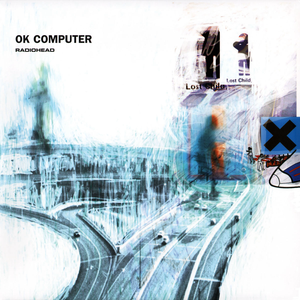
OK Computer is the third album by the English rock band Radiohead, released in 1997. It reached #1 on the UK Albums Chart and marked Radiohead's highest entry into the American market at the time, where it debuted at #21. OK Computer expanded the band's worldwide popularity, becoming the last Radiohead album to have a delayed release outside of the United Kingdom. As of 2007, it has been certified triple platinum in the UK and double platinum in the US. OK Computer included the singles "Paranoid Android", "Karma Police" and "No Surprises". The album was recorded in rural Oxfordshire and Bath, England with Nigel Godrich, who would work with the band on all their future recordings. Although OK Computer was dominated by guitar, its expansive sound and wide range of influences set it apart from many of the Britpop and alternative rock bands popular at the time, laying the groundwork for Radiohead's later, more experimental work. The lyrics, by Thom Yorke, and the album's artwork by Yorke and frequent collaborator Stanley Donwood, emphasised themes such as consumerism, social disconnection, political stagnation and modern malaise, though the band denied they set out to make a concept album. Upon its release, OK Computer received almost unanimously positive reviews. Consensus among critics was that the album was a landmark of its time and would have far-reaching impact and importance. NME gave the album a ten out of ten score, and reviewer James Oldham wrote "Here are 12 tracks crammed with towering lyrical ambition and musical exploration; that refuse to retread the successful formulas of before and instead opt for innovation and surprise; and that vividly articulate both the dreams and anxieties of one man without ever considering sacrifice or surrender. In short, here is a landmark record of the 1990s, and one that deserves your attention more than any other released this year." Taylor Parkes of Melody Maker connected the album's release to the era's feeling of paranoia and alienation about millenarianism, and said "It's as pained and as slow-moving as the emotions that inspired it. ... In one way or another, Radiohead have excelled themselves." Q awarded the album five out of five stars, with writer David Cavanagh stating that "the majority of OK Computer's 12 songs ... takes place in a queer old landscape: unfamiliar and ominous, but also beautiful and unspoiled. ... It's a huge, mysterious album for the head and soul." Nick Kent wrote in Mojo that "Others may end up selling more, but in 20 years time I'm betting OK Computer will be seen as the key record of 1997, the one to take rock forward instead of artfully revamping images and song-structures from an earlier era." In a four out of five stars review, Caroline Sullivan of The Guardian wrote that the album "is surprising and sometimes inspiring but its intensity makes for a demanding listen." The album was also favourably received by critics in North America. Rolling Stone gave the album four out of five stars. Reviewer Mark Kemp wrote that the album is "a stunning art-rock tour de force ... On OK Computer, Radiohead take the ideas they had begun toying with on The Bends into the stratosphere. ... OK Computer is evidence that Radiohead are one rock band still willing to look the devil square in the eyes", but warned "OK Computer is not an easy listen." An Entertainment Weekly review by David Browne gave the album a B+, and wrote that "When the arrangements and lyrics meander or sprout pretensions, the album grows ponderous and soggy. For all of Radiohead's growing pains, though, their aim — to take British pop to a heavenly new level — is true." In an article for The New Yorker, writer Alex Ross praised OK Computer for its progressiveness, and contrasted Radiohead's risk-taking with the more musically conservative "dadrock" of their contemporaries Oasis. Ross wrote that "Throughout the album, contrasts of mood and style are extreme This band has pulled off one of the great art-pop balancing acts in the history of rock." Ryan Schreiber wrote, in a highly enthusiastic ten out of ten review in his online music magazine Pitchfork, that "Radiohead's third piece of incredible work, OK Computer, is not only their best yet, but one of the year's greatest releases. The record is brimming with genuine emotion, beautiful and complex imagery and music, and lyrics that are at once passive and fire-breathing." Despite OK Computer's widespread praise, it also received some criticism. Robert Christgau of the Village Voice granted OK Computer a B− but ranked it as the "Dud of the Month" in his consumer guide; Christgau commented that the album lacked "soul", calling it "arid" and "ridiculous" and comparing it unfavourably to Pink Floyd. Andy Gill wrote for The Independent in an otherwise positive review, "For all its ambition, OK Computer is not, finally, as impressive as The Bends, which covered much the same sort of emotional knots, but with better tunes. It is easy to be impressed by, but ultimately hard to love, an album that so luxuriates in its despondency". While a review in Time was largely positive, particularly praising the songs "Airbag", "Paranoid Android", and "Let Down", reviewer Christopher John Farley criticised the second half of the album. Farley stated, "While the first half-dozen tracks reward repeated listenings with melodies that grow and bloom with familiarity, there is often no structure to be found in the remaining half-dozen numbers." At the end of 1997, OK Computer appeared in many critics' lists and listener polls for best album of the year. OK Computer topped the year-end polls of the magazines Mojo, Vox, Entertainment Weekly, Hot Press, Muziekkrant OOR, HUMO, Eye Weekly, and Inpress, and tied for first place with Daft Punk's Homework in The Face. The album placed second in NME, Melody Maker, Rolling Stone, Village Voice, Spin and Uncut. Q and Les Inrockuptibles both listed OK Computer in their unranked year-end polls. OK Computer was a nominee for the 1997 Mercury Prize, a prestigious award recognizing the best British or Irish album of the year. The album was nominated in the Album of the Year and Best Alternative Music Performance categories at the 1998 Grammy Awards, ultimately winning the latter award. OK Computer first appeared in a "best of all time" list three months after its release, placing 16 in a chart based on submissions by customers of Virgin Megastores. This chart heavily favoured recent releases, which suggested that OK Computer's popularity was a passing fad. However, OK Computer has since appeared frequently in professional lists of greatest albums. In early 1998, OK Computer topped a Q reader's poll of the greatest albums of all time, and in 2001 Q placed it at number one in a list of the top 50 pop albums of the last 15 years. A number of publications, including NME, Melody Maker, Spin, Alternative Press, Pitchfork Media, and Time placed OK Computer prominently in lists of best albums of the 1990s or of all time. In 2003, the album was ranked number 162 on Rolling Stone magazine's list of the 500 greatest albums of all time. Additionally, retrospective reviews from The A.V. Club and Slant Magazine have received the album favourably; likewise, Rolling Stone gave the album five stars in the 2004 Rolling Stone Album Guide, with critic Rob Sheffield saying "Radiohead was claiming the high ground abandoned by Nirvana, Pearl Jam, U2, R.E.M., everybody; and fans around the world loved them for trying too hard at a time when nobody else was even bothering." OK Computer was recorded in the lead up to the 1997 general election. It was thus seen by critics as encompassing public opinion through its "despairing-yet-hopeful tone" and themes of alienation. Yorke said his lyrics had been affected by reading a book about the two decades of Conservative government which were just coming to an end in 1997, as well as about factory farming and globalisation. However, in interviews Yorke expressed little hope things would change under the "New Labour" government of Tony Blair. With the approach of the year 2000, many people felt the tone of the album was millennial. Some critics have credited OK Computer with "killing" 1990s Britpop, as within a few years of its release, the dominant style of UK guitar pop had become slower and more melancholy. Many of the newer acts used similarly complex, atmospheric arrangements. The band Travis worked with Godrich to create the languid pop texture of The Man Who, which became the biggest selling album of 1999 in the UK. Others have credited Radiohead with beginning a mainstream revival of progressive rock and ambitious concept albums, though the band denied their affiliation with the genre. Radiohead described the prevalence of bands that "sound like us" as one reason to break with the style of OK Computer for their next album, Kid A. When asked by MTV interviewer Gideon Yago what the band thought of "bands like Travis, Coldplay, and Muse ... making a career sounding exactly like Radiohead did in 1997", Yorke replied "Good luck with 'Kid A'!". Several rock bands which later became popular, ranging from Coldplay and Bloc Party to TV on the Radio, have said they were formatively influenced by OK Computer—TV on the Radio's debut album, for instance, was titled OK Calculator. Additionally, the album's popularity paved the way for British alternative rock bands such as Muse, Snow Patrol, and Keane. Classical and jazz musicians such as Christopher O'Riley and Brad Mehldau have performed material from OK Computer, and composer Esa-Pekka Salonen said "When I heard 'OK Computer,' after five minutes I said, 'I actually get this. I understand what these people are trying to do.' And what they were trying was not so drastically different from what I was trying to do." Radiodread is a song for song cover of the album in a Reggae style. OK Computer has received great acclaim from the public and critics. It is often cited as Radiohead's best work and as a landmark album of its time. In 1998, it was nominated for a Grammy Award as Album of the Year, and won for Best Alternative Music Album. Read more on Last.fm.

Kid A is the fourth studio album by the English rock band Radiohead, released on 2 October 2000 by Parlophone. On the verge of a breakdown after promoting Radiohead's 1997 album OK Computer, songwriter Thom Yorke envisioned a radical change in direction. Radiohead replaced their rock sound with synthesisers, drum machines, the ondes Martenot, string orchestras and brass instruments, incorporating influences from genres such as electronic music, krautrock, jazz, and 20th-century classical music. They recorded Kid A with OK Computer producer Nigel Godrich in Paris, Copenhagen, Gloucestershire and their hometown Oxford, England. The sessions produced over 20 tracks; Radiohead saved many of them for their subsequent album, Amnesiac, released the following year. Radiohead released no singles or music videos to promote Kid A and conducted few interviews and photoshoots, instead becoming one of the first major acts to use the internet as a promotional tool. The album was made available to stream and was promoted with short animated films featuring music and artwork. Bootlegs of early performances were shared on filesharing services and the album was leaked before release. Kid A debuted at the top of the charts in Britain, where it went platinum in the first week, and it became Radiohead's first number-one album in the United States. Like OK Computer, it won a Grammy for Best Alternative Album and was nominated for Album of the Year. Its departure from Radiohead's earlier sound initially divided fans and critics, but it later attracted widespread acclaim; at the turn of the decade, Rolling Stone, Pitchfork and the Times ranked Kid A the greatest album of the 2000s, and in 2012, Rolling Stone ranked it number 67 on its list of the 500 greatest albums of all time. Read more on Last.fm.
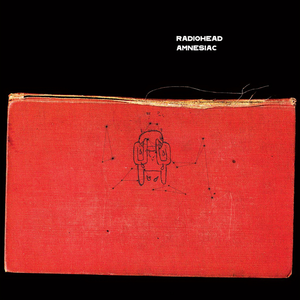
Amnesiac is the fifth studio album by the English alternative rock band Radiohead. It was released on 4 June 2001 in the United Kingdom and on 5 June 2001 in the United States and Canada, debuting at #1 on the UK charts and #2 on the Billboard Top 200. Seen as the furthest departure yet from the rock style and heart-on-sleeve songwriting of the band's early career, Amnesiac nevertheless has more audible guitar than its direct predecessor Kid A, and unlike that album, it spun off several singles. Like Kid A, it synthesizes influences of electronic music, ambient music, classical music, and jazz. Only These tracks on the album & All tracks written by Radiohead. not the 26 "Packt Like Sardines in a Crushd Tin Box" – 4:00 "Pyramid Song" – 4:49 "Pulk/Pull Revolving Doors"[note 1] – 4:07 "You and Whose Army?" – 3:11 "I Might Be Wrong" – 4:54 "Knives Out" – 4:15 "Morning Bell/Amnesiac" – 3:14 "Dollars and Cents" – 4:52 "Hunting Bears" – 2:01 "Like Spinning Plates" – 3:57 "Life in a Glasshouse" – 4:34 Read more on Last.fm.
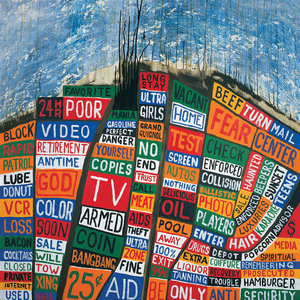
Hail to the Thief (subtitled The Gloaming, written as Hail to the Thief, (or, The Gloaming.) in the album booklet) is the sixth studio album by English rock band Radiohead, released on 9 June 2003 in the United Kingdom and 10 June 2003, in the United States. It debuted at number one in the UK and at number three in the United States. After two Radiohead albums that featured heavily processed vocals, less guitar, and strong influence from experimental electronica and jazz, Hail to the Thief was seen as a return to alternative rock, drawing its sound from every era of the band's existence. Preceded by the single "There There. (The Boney King of Nowhere.)", the album reached number one on the UK charts, and met with modest but worldwide commercial success, selling 994,000 units in the United States. Band members described the album as having a more "swaggering" sound and a relaxed recording process, in contrast to the tense Kid A and Amnesiac sessions. At nearly an hour in length, Hail to the Thief is the band's longest album, although many of its songs are within the three- and even two-minute range, shorter than the band's average. Thom Yorke said he was inspired by Beatles songs of that length which he thought felt much longer. This album has been released with the Copy Control protection system in some regions. The album received universal acclaim from professional critics upon release, based on a Metacritic score of 85/100, or 85%. Neil McCormick, writing in The Daily Telegraph, called it "Radiohead firing on all cylinders, a major work by major artists at the height of their powers", and the record performed typically well in magazines' end-of-year lists, especially in the United States. It was the fifth straight Radiohead release to be nominated for a Grammy for Best Alternative Album. Unswayed, the NME's James Oldham saw it as "a good rather than great record" and Alexis Petridis of The Guardian called it "neither startlingly different and fresh nor packed with the sort of anthemic songs that once made them the world's biggest band." In 2004, coproducer Nigel Godrich and engineer Darrell Thorp were honoured with Grammy Awards for their work on Hail to the Thief. Like the album itself, every song on the album has two titles. The intended titling for the album is as follows: 1. 2 + 2 = 5. (The Lukewarm.) - 3:19 2. Sit Down. Stand Up. (Snakes & Ladders.) - 4:20 3. Sail to the Moon. (Brush the Cobwebs out of the Sky.) - 4:18 4. Backdrifts. (Honeymoon Is Over.) - 5:23 5. Go to Sleep. (Little Man Being Erased.) - 3:22 6. Where I End and You Begin. (The Sky Is Falling In.) - 4:29 7. We Suck Young Blood. (Your Time Is Up.) - 4:57 8. The Gloaming. (Softly Open Our Mouths in the Cold.) - 3:32 9. There There. (The Boney King of Nowhere.) - 5:24 10. I Will. (No Man's Land.) - 1:59 11. A Punchup at a Wedding. (No no no no no no no no.) - 4:57 12. Myxomatosis. (Judge, Jury & Executioner.) - 3:53 13. Scatterbrain. (As Dead as Leaves.) - 3:22 14. A Wolf at the Door. (It Girl. Rag Doll.) - 3:21 However, due to a misprint in the album artwork, there was no period after the "5" in "2 + 2 = 5". Read more on Last.fm.

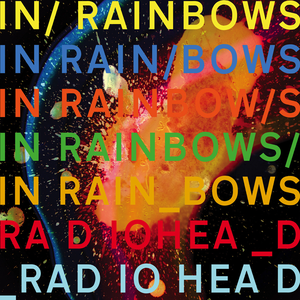
In Rainbows is the seventh studio album by the English alternative rock band Radiohead. It was first released on 10 October 2007 as a digital download that customers could order for whatever price they saw fit, followed by a standard CD release in most countries during the last week of 2007. The album was released in North America on 1 January 2008. In Rainbows was Radiohead's first release after the end of their contract with EMI and the end of the longest gap between studio albums in their career. In Rainbows was recorded in London, Somerset, Wiltshire and Oxfordshire with producers Mark Stent and Nigel Godrich. Radiohead worked on the songs for more than two years, beginning in early 2005. In between recording, the band toured Europe and North America for three months in 2006. Radiohead used a wide variety of musical styles on the album, incorporating string arrangements and electronic music, pianos, celestes and the ondes Martenot, yet renewing their focus on guitars, drums and bass as lead instruments. The songwriting on In Rainbows was more personal than that of Radiohead's other work, with singer Thom Yorke describing it as his attempt to write "seduction songs". Upon its retail release, In Rainbows entered the United World Chart, UK Album Chart, and the U.S. Billboard 200 at number one. In Rainbows also earned widespread critical acclaim, and several publications ranked it as one of the best albums of 2007. Read more on Last.fm.
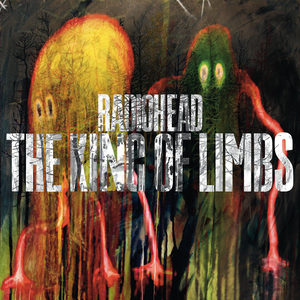
The King of Limbs is the eighth studio album by English alternative rock band Radiohead, produced by Nigel Godrich. It was released on 18 February 2011 as a download in MP3 and WAV formats. It was followed by a physical CD release on 28 March 2011. A special "newspaper" edition was released on 9 May. The "newspaper" edition contained two 10-inch vinyl records in a special record sleeve, many large sheets of artwork, 625 tiny pieces of artwork, a compact disc, and a colour piece of oxo-degradable plastic package. The album was released by TBD in the United States, XL in the United Kingdom and Hostess Entertainment in Japan. The album was announced on Radiohead's website on 14 February 2011, four days before release. The name of the album refers to an oak tree in Wiltshire's Savernake Forest, thought to be 1,000 years old. The tree is a pollarded oak, referring to an ancient technique for harvesting timber for fencing and firewood. Though it does not feature on maps, the tree is said to be 3 miles (4.8 km) from Tottenham Court House, where Radiohead recorded part of their previous album In Rainbows. On 18 February, Radiohead's official blog published the first song from the album, "Lotus Flower", with an accompanying music video, followed by a post announcing the album was released. Read more on Last.fm.
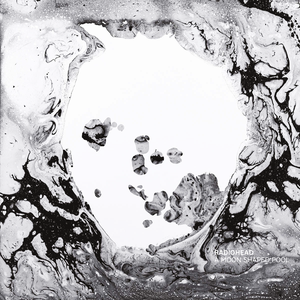
A Moon Shaped Pool is the ninth studio album by the English rock band Radiohead, released as a download on 8 May 2016. The album's first two singles were "Burn the Witch" and "Daydreaming". CD and LP editions will be released by XL Recordings on 17 June 2016, followed in September by a "special edition" containing additional artwork and two bonus tracks. The album was produced by Nigel Godrich. Radiohead began work on A Moon Shaped Pool intermittently after finishing the 2012 tour for their previous album, 2011's The King of Limbs. Several songs on the album date back to much earlier in the band's career; "True Love Waits" has been performed as far back as 1995, while "Burn the Witch" dates back to the sessions for the band's 2000 album Kid A, although it was not released to the public until the release of the single. "Present Tense" was composed as early as 2008, while "Ful Stop" and "Identikit" were first performed live in 2012. The album contains strings and choral vocals arranged by multi-instrumentalist Jonny Greenwood and performed by The London Contemporary Orchestra. During the 2012 tour for their eighth album, 2011's The King of Limbs, Radiohead performed several new songs, including the future Moon Shaped Pool tracks "Identikit" and "Ful Stop". While on tour, the band recorded a version of "Identikit" and another unidentified song at Jack White's Third Man Records studio. After the tour, Radiohead entered hiatus and the band members worked on side projects. In 2013, singer Thom Yorke and long-time Radiohead producer Nigel Godrich released an album, Amok, with their band Atoms for Peace; in 2014, Yorke and drummer Philip Selway released their respective second solo albums, Tomorrow's Modern Boxes and Weatherhouse. Guitarist Jonny Greenwood composed film scores, including the 2014 Paul Thomas Anderson film Inherent Vice, and worked with classical musicians. Radiohead and Godrich recorded A Moon Shaped Pool in the La Fabrique studio in France. In February 2015, Selway told Drowned in Sound that Radiohead had worked from September to Christmas 2014, and would resume work that March. In the same month, Greenwood told Pitchfork that Radiohead had changed their methods, "working in limits" and using "very old and very new technology" together. In June 2015, Greenwood said that the band had been slow to regain momentum after their hiatus; Selway stated that the band had worked in "fits and starts", but that a "full schedule" would begin from September. In November 2015, composer Robert Ziegler, who worked with Radiohead on The King of Limbs, tweeted photos of the band recording with a string orchestra. The strings were arranged by Greenwood and performed by the London Contemporary Orchestra, who previously worked with him on the score for The Master. In December, Yorke performed two Moon Shaped Pool songs, "The Numbers" (then known as "Silent Spring") and "Desert Island Disk", at the United Nations Climate Change Conference at Le Trianon in Paris, France. On Christmas Day 2015, Radiohead released a new song, "Spectre", on the audio streaming site SoundCloud. It was written for the James Bond film of the same name, but went unused. Several Moon Shaped Pool tracks were written some time before the album's release. "True Love Waits" dates to at least 1995; a live version was released on the 2001 live album I Might Be Wrong: Live Recordings. Godrich said of the song in 2012: "We tried to record it countless times, but it never worked ... To Thom's credit, he needs to feel a song has validation, that it has a reason to exist as a recording. We could do 'True Love Waits' and make it sound like John Mayer. Nobody wants to do that." Radiohead worked on "Burn the Witch" during the sessions for their albums Kid A (2000), Hail to the Thief (2003), and In Rainbows (2007), and lyrics from the song appeared in previous album artwork and on the Radiohead website. "Present Tense" dates to 2008, and Yorke first performed it (then known as "The Present Tense") in a solo set at the UK Latitude Festival in 2009. A Moon Shaped Pool is an art rock album. It retains Radiohead's electronic elements such as drum machines and synthesisers, but according to Rolling Stone, supplants them with "an embrace of gorgeous timbres and melody", making use of acoustic guitar, piano, and strings. It makes heavy use of strings and choral vocals; according to Pitchfork, "while lite orchestrations are nothing new for the band, A Moon Shaped Pool brings them to the fore of the songwriting, and Greenwood’s arrangements do more heavy lifting than on any other album." "Burn the Witch" features col legno strings, meaning that the players strike their strings with the stick of the bow rather than bowing them, creating a percussive effect. "Daydreaming" features a piano figure and backwards vocals that resemble "someone struggling for breath". "Identikit" has a jam-like opening, with "snatches" of vocal and guitar, and ends with an "agitated" guitar solo. The Guardian felt that the strings, bassline and funk rhythm of "The Numbers" was a homage to Serge Gainsbourg’s 1970 album Histoire de Melody Nelson. "Present Tense" features a Latin shuffle beat. "Tinker Tailor Soldier Sailor Rich Man Poor Man Beggar Man Thief" combines Greenwood's strings with electronic percussion and a distorted keyboard. "True Love Waits", first performed on acoustic guitar over 20 years prior, is performed on piano, with additional overdubbed pianos building as the song progresses. The tracks are listed in alphabetical order. Many of the songs discuss love, forgiveness, and regret with, according to Pitchfork writer Jeremy Larson, "a sense that beyond tectonic heartbreak there is an anaemic acceptance that is kind of beautiful if you don’t get too sad about it". Several critics felt the album's lyrics were coloured by Yorke's recent separation from his partner of almost 25 years. The lyrics of "Burn the Witch" were interpreted by Pitchfork writer Jillian Mapes as criticism of authority and groupthink, expressing a "deep sense of dread and skepticism"; The Guardian felt the song might address mass surveillance or the threat to open discussion posed by the self-policing users of social media. "The Numbers" addresses climate change. The artwork for A Moon Shaped Pool was created by Stanley Donwood, who has worked with Radiohead since 1995. He said it was "made by the strong warm winds of southern France." On 30 April 2016, fans who had previously made orders from Radiohead received embossed cards with lyrics from the album's lead single, "Burn the Witch". On 1 May, Radiohead deleted all content from their website and social media profiles, replacing them with blank images. After releasing excerpts on Instagram, they released "Burn the Witch" as a download on 3 May, accompanied by a stop-motion animated music video. The video homages the animation style of the 1960s English children's television Trumpton Trilogy programmes and the plot of the 1973 horror film The Wicker Man. On 6 May, Radiohead released the second single, "Daydreaming", accompanied by a music video directed by Paul Thomas Anderson. The video was projected in 35 mm film in select theatres. On the same day, Radiohead announced that their ninth album, then untitled, would be released at 7pm BST on 8 May, with physical formats to follow from 17 June via XL Recordings. It was made available to buy from Radiohead's website and the digital music services Google Play Music, Apple Music, iTunes Store, Amazon Music, and Tidal. Customers can also order a special edition of the album from Radiohead, with packaging "inspired by the albums for 78rpm shellac records" in the studio where they recorded. It includes the album on two heavyweight 12" vinyl records, a CD with two bonus tracks, 32 pages of original artwork, and an original piece of master tape, less than a second in length, from one of Radiohead's past recording sessions. As tape degrades over time, the band decided that "rather than it ending up as landfill we would cut it up and make it useful as a part of the special edition." A Moon Shaped Pool was played in its entirety on BBC Radio 6 Music on the day of release, presented by Tom Robinson. Radiohead will tour in support of the album from May to October 2016, with dates in Europe, North America, and Japan. A Moon Shaped Pool has a score of 89 out of 100 on the review aggregator website Metacritic—indicating "universal acclaim." Andy Beta of Rolling Stone described it as "a haunting, stunning triumph" and Radiohead's "most gorgeous and desolate album to date." Beta praised the individual songs and cohesion of the album; he also commented positively on the mix of electronic, string, and keyboard elements. "Radiohead's long-standing embrace of edgy electronics has now been supplanted by an embrace of gorgeous timbres and melody, the more disarming the better.... If anything, A Moon Shaped Pool reveals within Radiohead a newfound appreciation of, if not folk music, then the form's ability to express melancholy through their melodies." He thought that "Daydreaming" encapsulated the album best. Jon Pareles, writing for The New York Times, wrote that A Moon Shaped Pool was perhaps "[Radiohead's] darkest statement — though the one with the band’s most pastoral surface." He praised Yorke's vocals and Greenwood's string arrangements, writing: "Both Mr. Yorke and Mr. Greenwood are relentlessly inquisitive listeners, lovers of melody and explorers of idioms, makers of puzzles who don’t shy away from emotion." Alexis Petridis of The Guardian felt the album was an improvement over The King of Limbs, writing that Radiohead had achieved "something they've never achieved before... alone among their commercial peers, Radiohead are held to not just release albums but make grand artistic statements worth dissecting and poring over." Chris Barton of The Los Angeles Times also commented positively on the album, writing that it is "an album that reaches for something far more organic and immediate." Justin Joffe, writing for the New York Observer, praised the album. "Pool holds moments of pure heartbreak, loneliness and emotional despair, too, rooted in themes of human intimacy that the band hasn’t explored this bluntly in years. It’s a stunning display of naked vulnerability and a notable achievement." The reviewer lauded the majority of the tracks, particularly the inclusion of "True Love Waits" at the end of the record. He concluded: "Radiohead remain dedicated craftsmen of strange new sonic universes." Nina Corcoran of Consequence of Sound also praised the addition of older songs. "Waiting five years to hear previously released tracks is worth it precisely because Radiohead finally feels connected enough to perform them with meaning." She commends the revision of "True Love Waits", noting it "allowed Radiohead to peel its words when riper than ever." Chris Gerard of PopMatters referred to the album as "worthy of Radiohead’s peerless catalog, a rich addition to what is the most vital and important string of rock albums of the last 30 years." Patrick Ryan of USA Today opined that "the brooding, symphonic and poignant A Moon Shaped Pool, released Sunday, was well worth the wait." Jamieson Cox of The Verge praised the album's emotional magnanimity and for offering up something for everyone, while MTV's Simon Vozick-Levinson noted that Radiohead's "evolution can still blow even a jaded fan's mind." 1. Burn the Witch - 3:41 2. Daydreaming - 6:24 3. Decks Dark - 4:41 4. Desert Island Disk - 3:45 5. Ful Stop - 6:07 6. Glass Eyes - 2:53 7. Identikit - 4:27 8. The Numbers - 5:46 9. Present Tense - 5:07 10. Tinker Tailor Soldier Sailor Rich Man Poor Man Beggar Man Thief - 5:04 11. True Love Waits - 4:43 Read more on Last.fm.